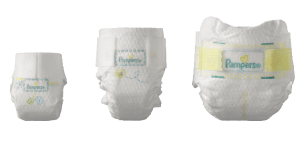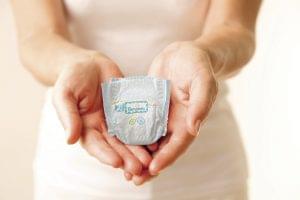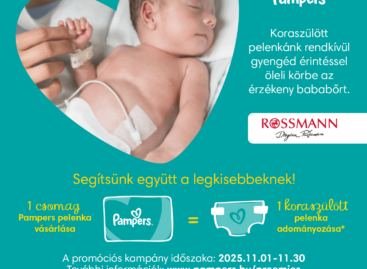Helping the youngest babies
 In Hungary the proportion of premature births is 9 percent – this means that 8,500-9,000 babies and mothers are affected in a year; more than 6,000 babies start their lives in Perinatal Intensive Care Centres (PIC). It takes 5-10 minutes for at least two nurses to change the nappies of babies born too early. Pampers makes it a priority to take good care of premature babies, so they have developed Pampers Preemie Protection Nappies, designed especially for babies born with a weight from 800g.
In Hungary the proportion of premature births is 9 percent – this means that 8,500-9,000 babies and mothers are affected in a year; more than 6,000 babies start their lives in Perinatal Intensive Care Centres (PIC). It takes 5-10 minutes for at least two nurses to change the nappies of babies born too early. Pampers makes it a priority to take good care of premature babies, so they have developed Pampers Preemie Protection Nappies, designed especially for babies born with a weight from 800g.

Zsófia Balogh-Simon, P&G’s baby care category manager told: these nappies make sleeping more comfortable and taking care of babies is easier for nurses. Within the framework of a long-term nationwide donation programme, from this spring Pampers Preemie Protection Nappies will turn up in every hospital with a perinatal care unit.These nappies won’t be available in shops. What is more, from April 1 percent from the price of every Pampers nappy sold in Rossmann shops goes to the National Association for Premature Babies (KORE).

KORE president Zsuzsanna Földvári Nagy revealed that they are most happy about P&G and Rossmann’s joint initiative. KORE knows that thanks to them they can make the lives many mothers and premature babies easier. Rossmann’s PR manager Nelli Kadlok added that between 3 April and 30 June 2018 Rossmann stores will donate private label nappies to KORE in the value of 1 percent from the price of each Pampers nappy sold. (X)
Related news
Procter & Gamble Appoints Shailesh Jejurikar As CEO
🎧 Hallgasd a cikket: Lejátszás Szünet Folytatás Leállítás Nyelv: Auto…
Read more >Related news
Burger, condom and red rose: this is what Valentine’s Day is like at Wolt
🎧 Hallgasd a cikket: Lejátszás Szünet Folytatás Leállítás Nyelv: Auto…
Read more >








